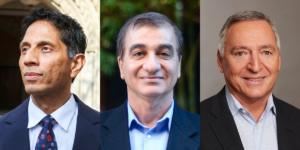
Image credit: Istock.
Part showcase, part pitch-fest, and part networking event, the second annual USC Viterbi Ershaghi Center for Energy Transition (ECET) Summit was held at the USC Hotel last month.
The event brought together academics and industry experts to reflect on the status of energy transition.
Yannis C. Yortsos, Dean of the Viterbi School of Engineering, and Andrea Hodge, Chair of the Mork Family Department of Chemical Engineering and Materials Science, gave welcome talks. In her remarks, Andrea Hodge said, “Energy is about equity, sustainability, and the future of humanity.” ECET Director, Professor Iraj Ershaghi, summarized ECET’s accomplishments over the last year and thanked Gary Buntmann, principal donor, and other ECET sponsors. The conference was predicated on the idea that people need to work together—no one discipline can solve this. The energy transition requires different mindsets from every cadre of society.
The agenda included many contributions from keynote speakers and 13 USC faculty presentations, many of whom received seed funding from ECET. An audience of almost 100 guests listened to the various addresses that emphasized ECET’s mission to foster “sustainability while balancing socio-economic impact and resiliency.” With energy transition a complex process that needs to balance current demand, supply, and dependence, many key research issues need to address the acceleration of viable technologies and at discussion was how to ensure their widespread adoption equitably.
The ECET Summit also acts as a forum to help incubate and adopt emerging technologies. A wide range of ideas were shared in a series of panels. Multiple USC faculty supported by ECET made presentations on topics such as strategies for direct air capture and decarbonization including the use of inorganic membranes; the conversion of carbon dioxide and methane for emissions reduction. In addition, other topics discussed included the use of ammonia in hydrogen production and transportation, catalytic hydrogen production, the management of legacy oil and gas wells, increasing operational efficiencies in existing technologies, and the role of sensors and artificial intelligence in energy management among many others. In addition, ECET-sponsored faculty research highlighted included novel uses of graphene, new ideas for energy storage, alternative energy sources such as low-temperature geothermal fluids, and hydrogen storage and transportation. In total, and over two years, ECET has funded approximately $1.5M in research projects and outreach related to energy transition research.
Invited contributors included NYU Professor Steve Koonin, Liberty Energy CEO Chris Wright, Trem Smith from TS and J Consulting, Michael Hoban from the Chevron Hydrogen Division, Med Kamal, former SPE President Anand Mohanrangan from McKinsey, and Shahram Farhadi from ENSENSE.
Also highlighted were a series of podcasts produced by alumnus Kyle Korner and Jim Crompton and summarized by USC Annenberg Ph.D. student Paulina Lanz. Workforce-related issues were presented by Mike Hauser via a project supported by Todd Stevens. Finally, Mark Fissell and Warner Williams were recognized for their support their support of several ECET K-12 STEM activities.

During the course of the day, several awards, generously sponsored by Ali Daneshy and recognizing the best ideas in energy transition, were presented to Mohammad Alaskar representing Aramco America’s Labs, Sami Alnuaim representing KFPUM, and Maryam Omidvar represented by David Pratt.
The academic part of the summit was moderated by Donald Paul, Executive Director of the USC Energy Institute, with session chairs William Milliken and Andrew Seto from Energi Simulation. Marsha Ershaghi, from Tapestry Networks, skillfully coordinated the summit organization. Chevron Corporation provided financial support for the Summit.
Published on May 20th, 2024
Last updated on May 20th, 2024











